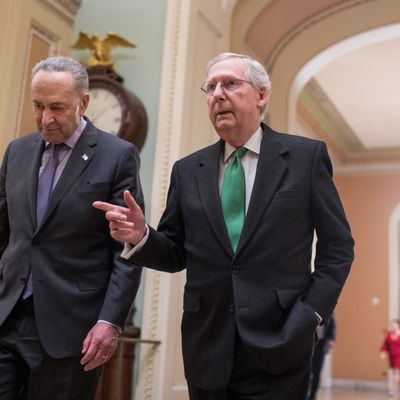
Despite all the huzzahs over senators reaching a “budget deal” that will avoid a second government shutdown (while encompassing a fifth temporary “stopgap” spending measure), a number of things need to fall into place before tonight’s expiration of the previous stopgap spending bill.
First of all, the deal needs to be passed by the full Senate. This is a pretty near certainty and will probably happen this afternoon or early evening. This is definitely the easiest part of the process. Yes, a handful of conservative senators may vote against it as a protest against ramped-up spending, and yes, some Senate Democrats may vote no, just as they did last month when a sufficient number of their colleagues chose to throw in what they thought to be a weak hand and end the previous shutdown. But between Schumer’s endorsement of the deal and Trump’s signal that he’ll sign it if it reaches his desk, it’s clear that the 60 votes needed for it will be there. Republicans are happy with the big defense-spending boost in the deal, and Democrats are happy with a corresponding nondefense-spending boost, plus some specific money for community health centers and a generous allocation for disaster recovery. Senators from both parties are quietly pleased at getting a debt-limit suspension out of the way as well.
Next, the hard part: getting the Senate bill through the House by midnight. Part of the plan is to leave the House, where there will be much more vocal opposition to the deal, as little time as possible between the moment it passes the Senate and the midnight deadline (which could, of course, be extended for a day or two if something goes wrong and the government is about to shut down). It’s likely that the Senate deal would not have been announced without assurances from Paul Ryan that he’d have the votes to win House passage. But the math remains a bit tricky.
Having spent weeks demanding a defense-budget boost unlinked from any nondefense increase (or indeed, matched with domestic-spending cuts) significant defections are inevitable from the House Freedom Caucus. The addition of the debt-limit suspension, which many Freedom Caucus members oppose as a matter of principle, made some conservative opposition even more likely. And the noise they are making is feeding media talk of a “conservative revolt” against the deal:
“I’m not only a ‘no.’ I’m a ‘hell no,’” quipped Rep. Mo Brooks (R-Ala.), one of many members of the Tea Party-aligned Freedom Caucus who left a closed-door meeting of Republicans saying they would vote against the deal.
It’s a “Christmas tree on steroids,” lamented one of the Freedom Caucus leaders, Rep. Dave Brat (R-Va.).
“This spending proposal is disgusting and reckless — the biggest spending increase since 2009,” conservative Rep. Justin Amash (R-Mich.) tweeted after the meeting. “I urge every American to speak out against this fiscal insanity.”
All of this hyperventilating, however, obscures the fact that House GOP defections beyond the ranks of the 36-member HFC will be rare.
Not only will there be opposition from the right in the House — many Dems will likely fight the bill. Similarly, many House Democrats are vowing to oppose the deal unless Paul Ryan agrees to a vote in the very near future on Dreamer protections. That, indeed, was the ultimate point of Nancy Pelosi’s remarkable eight-hour speech on the House floor yesterday. But Pelosi also made it clear that she would not be exercising party discipline on Democrats to keep them from giving Ryan the votes he needs to offset any conservative losses. So that is almost certainly what will happen.
And even if it passes, the road ahead looks bumpy … While the odds seem good for getting the new deal implemented and keeping the government open, this hardly clears the decks of pressing and divisive issues in Congress. Technically, the deal only covers spending through March 23. The broad agreement over defense and nondefense spending levels will have to be implemented via actual appropriations bills that will be rolled into an omnibus measure before that final, final deadline. The decision to exclude immigration items from the deal, moreover, means both Houses will likely be consumed with fractious debates over Dreamers, border and interior enforcement, and proposed legal immigration restrictions, probably beginning next week. This Congress may need an impending government shutdown to get basic governing decisions done. But it can loudly debate important and unimportant topics alike with no prospect of resolution.






























